A DJ, event producer, community builder, and long-time Burner, Jay Austin Gregory has been bringing theme camps, musical experiences, pancakes, and an airship to Black Rock City since 2000. This is a post in our 2023 Back to Black Rock City series — covering a spread of topics we hope get you excited as you prep to head back to the dust.
Dom: I would love for you to tell me about your history with Burning Man. How did Burning Man become a part of your life and when?
Cptn Jay: I have been in love with dance music and the expression of dance music through parties and events and raves since the late nineties, and if you were in the Bay Area around that time and you were involved in the scene, Burning Man was a thing that came up. It never really piqued my interest personally, just because it was synonymous with drugs and counterculture and at that point in my life, I was very straight edge and didn’t do drugs; I had a deep connection with dance music without all that. But the push was strong. Friends of mine who I did parties with went in 1999, and came back like “Jay, you have to go. We have to go to Burning Man altogether. We have to do a party there. It’s just a fantastic, amazing, life-changing experience.” So once I had that kind of official stamp of approval from really close people I trusted, did events with, DJ’d with, I was like, all right, I’ll give it a try. And so 2000 was my first year, and I co-founded a camp called Pancake Playhouse.
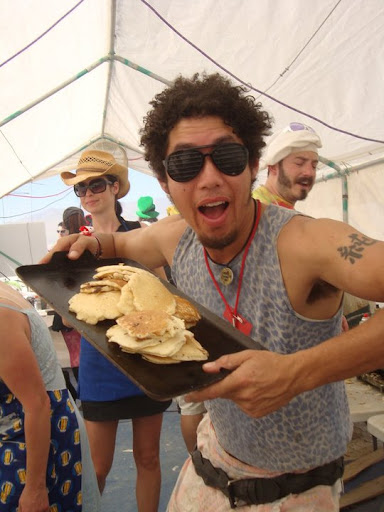
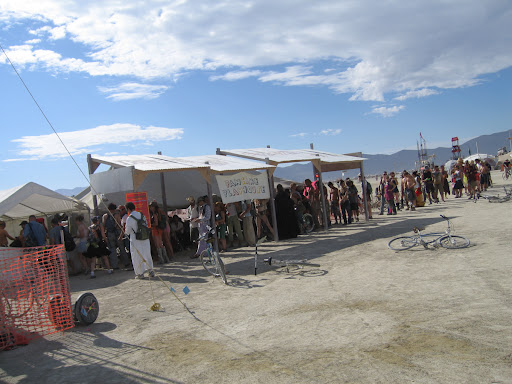
I’m going to make an admission to you, Mr. “Officially working for Burning Man dot org.” We wanted to have a dance party, but we kind of didn’t have the budget to do a giant soundstage. Our idea was that we would do a thing in the daytime — we had little games that people could play, we had a craft station, and of course we had a chill dome and we had pancakes. But at night we were going to be like a secret renegade rave camp INSIDE [the] Center Camp [ring]. We thought, “It’s going to be awesome. Everyone’s going to come to our thing cause there’s nothing like that around there.” Well, all of the day stuff went off, especially the pancakes — people LOVED the pancakes. And absolutely no one came to our night parties. They were pretty hilarious. Everybody was like, “We’re going to go out to the playa at night and go explore, but have fun with your turntables and your two speakers here.”
So our secret mission of having a renegade rave Center Camp did not land. We didn’t even need to be admonished, it just didn’t work. It turned out the gift the people wanted was pancakes and soft rock, so we just doubled down on that the next year and Pancake Playhouse was kind of born! It’s still going too; I don’t know what the longest running theme camps are, but Pancake Playhouse is up there at 23 years! After around 10 years of Pancake Playhouse, while I still loved the camp and community, I started wanting something different from my Burning Man experience. I wanted to go back to the thing that got me excited to go to Burning Man in the first place, which was sharing dance music experiences that connected people. It was right around then that I got the offer to participate in the art car that became the Airpusher Steampunk Airship.
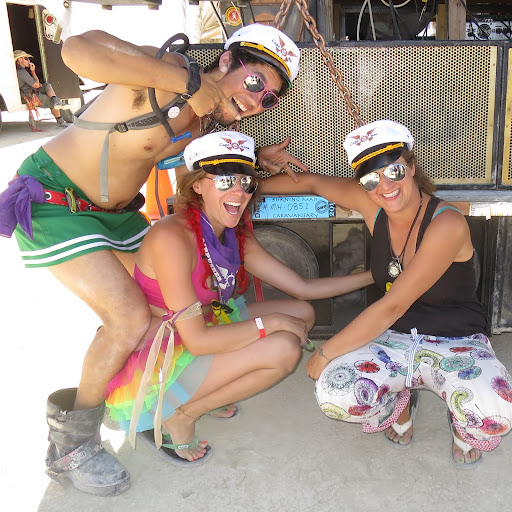
Just to go back and clarify something — before Burning Man came into your life in the late nineties, were you already spinning or were you more so just an aficionado and a party planner? How did DJing specifically start for you?
I have always deeply loved music, and DJing became a natural offshoot of that. When I discovered dance music, it was kind of the first music that filled a certain part of my soul. By ‘96 or ‘97, I was going to raves, and as soon as I saw that there was a person selecting the music for everyone to listen to, I was like, “I want to do THAT.” In 1998, [a friend and I] moved in together — he bought one turntable and I bought a second turntable and a mixer and we kind of taught each other how to DJ. When we went to record stores we’d buy mix tapes and dissect the mixing, then go out to parties and just hover near the DJ’s and just watch them do what they do until we kind of figured shit out. As we got better we started to throw our own parties; we’d been DJ’s for about three years and been doing parties for around two before my first Burn.
We’ve got your background with Pancake Playhouse and DJ’ing. Why don’t you tell me about how the Airpusher mutant vehicle came into your life, and your leadership role within the crew?
I was kind of looking for a little bit more out of my Burning Man experience when, out of the blue in 2011, community friend and fellow DJ “Edmundo” hit me up and was like, “Hey, I have an art car. Do you want to do an art car at Burning Man with me?” And I was like, “Fuck yeah, I want to do an art car at Burning Man with you, let’s fucking go!” He’s like, “Great. It’s parked at NIMBY, it’s called Airpusher, and it needs a lot of work. Come check it out.” So I go down there and check it out and it’s this two level kind of a situation, a second deck on top of a truck, and let’s just say it was a blank canvas. It was ready for another round of design work to be done to it, to turn it into something more than it was. Being the second person involved in this whole new iteration of the vehicle, I kind of knew that it was going to be a lot on me, Edmundo, and whoever else we brought as leads. But taking a leadership role in things I’m passionate about never feels like work to me — it always felt like a natural calling.
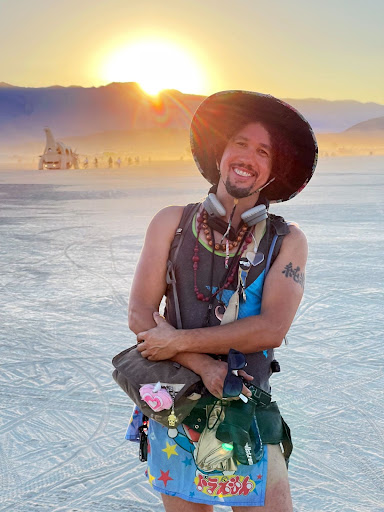
The first few years the leadership roles were not super well defined, and I always tried to collaboratively share decision making; it was messy. As Airpusher evolved, our leadership model evolved. We had “Captains” for a while, but there was too much work for the role. We’re currently in a distributed organizational model where different people take on different aspects of the operation — this really helps with not burning people out. We have a Board that I’m not on! But we can’t plan for everything — there are always some people behind the scenes, me being one of them, who kind of know where the gaps might be and know how to subtly encourage the bigger group to make sure the community is healthy and Airpusher going to Burning Man is a smooth, enjoyable experience for everyone.
I know firsthand how complex it is to build, transport, set up, and maintain an art car at Burning Man or out in the world beyond the event — especially one that has a sound/music component. Most participants just see the final result, i.e. a DJ playing on a fully loaded art car with the lights going and all the bells and whistles. Can you give readers a breakdown of all the steps involved in setting up Airpusher (either in BRC or elsewhere), and the work that it takes to see a DJ spinning on it?
Yeah, that’s a great question, especially because there are parts of the process that are very unique to this being a thing that’s owned by a collective. Airpusher is not owned by any one person. It’s kind of collectively owned by this group of people. I can’t just say, “Hey, we’re going to do this thing.” I’ll describe the steps for an event off the playa, but a lot of this is true for when we’re heading to Burning Man too. When people reach out about us about bringing Airpusher to an event, I’ll say, “Great, that sounds very interesting. Tell me more. How many people are going to be there? Who are the other DJ’s? Who are the other collectives that are going to be a part of this thing? What are the hours of operation? Let me pitch it to the crew and get back to you.” Then I will take it to the crew and say, “Hey crew, we have this potential event. Do we want to do it?” And the way the crew votes if we do the gig or not is by individuals signing up to volunteer; if we get enough volunteers, we do the show! Generally everything on Airpusher is volunteer-based, including the DJ spots.
So let’s say the crew’s excited about a show. The next step is getting down into the details about what we need as far as people, the ship, and any other supporting items like lights, sound, decor, DJs, etc. We need to understand setup time, strike time, hours of operation and then load in time, which sometimes is different from the setup time. We need to be able to make sure we have the people to get the necessary stuff from our storage to the venue. If the sound system is involved, that usually means renting a secondary truck to take the sound system in, along with lights and decor items. We’ll then have a second team picking up Airpusher with a mechanic and a follow driver to make sure Airpusher and the driver are supported if it breaks down on the way; which has definitely happened. At the location, we’ll have the setup team there. We unpack the truck. Airpusher is generally late because it’s always late for everything.
Setting up the airship has been something we’ve been trying to optimize for a decade. Our first year at Burning Man, it took us five days to build it. We had to build the balloon from scratch the first couple years since it was like an exoskeleton balloon. The balloon’s inflatable now — that alone shaved two days off the build. Now, if we’re just doing the balloon and the umbrellas, we can set it up in an hour!
For the lights, the best thing we can do is get a lighting director inside the balloon to manually set them up and position them properly. That takes a couple hours in and of itself. Setting up the sound system is a two hour job for a separate team. So the overall set up time, if we’re doing lights and sound, is around four or five hours at the venue. Only then the DJ can put on a track and start the dance party.
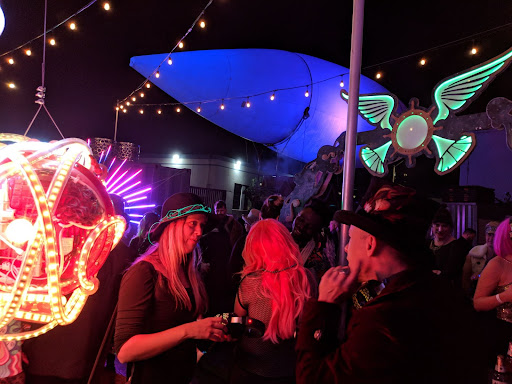
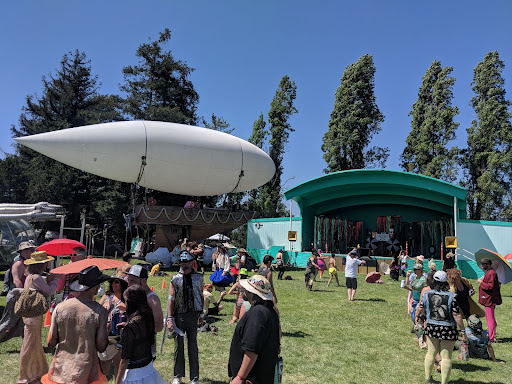
There’s often a lot of sweat equity involved in how DJs are chosen to play in Black Rock City. From what I know about you guys, a lot of the people who play are people who camp with Airpusher and people who help build it or take care of other steps you mentioned in the previous answer. Can you tell me a little bit about how Airpusher chooses who gets to DJ?
It’s at the intersection of a lot of things about being with Airpusher. So the baseline is if you are a DJ and you join up with Airpusher and you are a proactive participant in the community and creating or maintaining the ship, you will get at least one set on the ship at the Burn. It takes a village to bring Airpusher to the playa and we want to be able to say thank you for the work and help. So that’s first and foremost and we will never sacrifice anyone’s DJ spot for any other reason. If a world-famous DJ wanted to play on the ship, it wouldn’t matter. It’s a passion project and it’s an all volunteer project, so we really want to reward the people who are making it to be able to do the thing they love to do, which is to play music they love for people in this magical place because without their help and their effort, it wouldn’t go out there. We’re not hiring people to build this for us. So it’s a very direct give and take, you know — help build it and you can create this magical experience with us through your music. So that is 100% the primary focus.
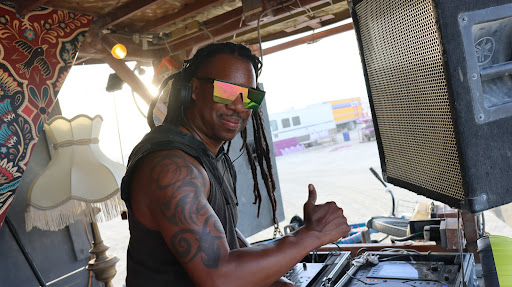
We generally have more slots than there are DJs within our crew, so then we start asking, “Okay, who else do we want to invite in to play?” We have a form, which we don’t generally proactively promote, but it’s the way we intake additional DJs. We all have friends in our community that have helped us out throughout the years who are DJs, and if they ask, we send ’em the form. We have other friends who might be their first Burn or whatever. We’ll send ’em the form. And then sometimes there are bigger name DJs who come to us through agents or through other people who ask if they can play. And then we’ll also send them the form. Generally, a few weeks before the Burn, the music team will sit down and create the schedule. There are two types of events with DJs that we do with the ship — first is playa cruising where we go out, cruise around, and just see what we get into. The other kind of event we do is bringing the ship to a specific location and having a party at a place. So we’ll create the schedule with those two kinds of things. We also see if anyone in the crew has a particular idea for a party — there are some people on the team who are not DJs and want to do things with the ship and the sound system, and we definitely encourage that.
So we do the first pass at the schedule, and generally we allow the Airpusher team DJs to look at the schedule and pick their set and where they want to play. Then we’ll take into account any of the DJs who applied on the form or any other DJs we know about. If there are spots left over, we’ll book some of them. And then if there are any Airpusher people interested in a second set, we’ll consider that as the final group. That’ll be the schedule.
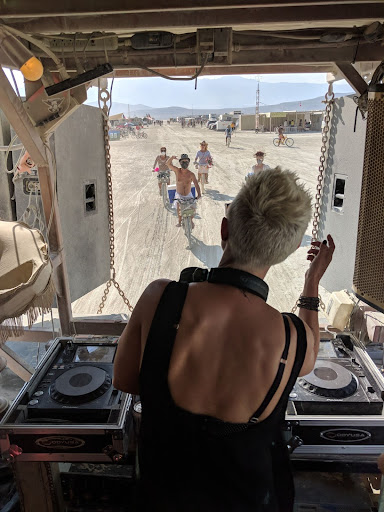
What are some examples of the more concerning cultural trends you’ve observed or felt around dance music culture in Black Rock City or connected to Burning Man?
Oh man, it’s tough. I’m going to start the answer with something that’s not necessarily tied to dance music, but is kind of tangential or in a bigger concentric circle: the amount of money that is being invested into experiences at Burning Man is really challenging to compete with. And I know it’s not a “competition,” but our Airpusher community is creating this gift of an experience, taking Burners around on an art car and having dance parties, but we’re not in the same pool with people who are spending multiple millions of dollars on the same experience. So it can be really, really, really challenging to find your footing.
I don’t want to call it a problem because I don’t want anyone to say “No, you can’t spend a bunch of money on your Burning Man project.” People have the opportunity to dance to a $100,000 or $200,000 sound system out in the desert. That’s fantastic! It just makes it challenging to figure out where what we’re doing fits into that. Specifically with the DJ stuff, it’s tough. Gifting and Decommodification are two of my favorite principles but sometimes the gift you want to give is not the same as the gift that’s needed or will be well received by the community. I think there’s an oversaturation of a certain kind of gift — DJs and sound camps, and bars, etc. — and that’s challenging for me as I’m part of yet another one of these experiences! There’s just so much literal and figurative noise on the playa.
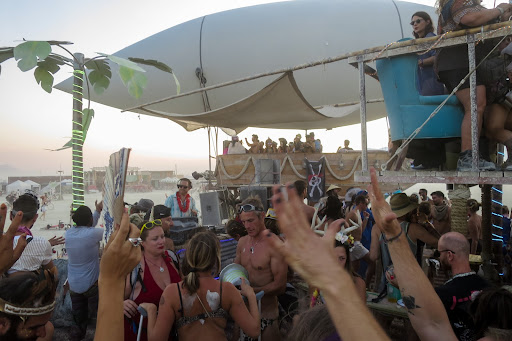
Decommodification is a very important principle of Burning Man, and it’s one that could use some attention as it relates to dance music culture and DJ stardom. This is hard to communicate because there’s so much gray area and I don’t want to come off as if I’m saying any one camp or any one DJ is doing something wrong or bad, but it does feel like there is a transactional nature in the arrangements of some big sound camps/art cars with some of the big DJs who play them. The camp/car gets the Big Name and the DJ gets to leverage their “playing at Burning Man” status out in the world. You can kind of see this when some DJs announce they’re playing at Burning Man on their tour, or in these crazy overproduced videos that they put out of their sets at the Burn. Or they’ll tie their music releases to stuff they played at Burning Man. I’m not saying DJs shouldn’t post their sets from Burning Man, I do that too! But the scale I’m seeing it at these days, it just doesn’t feel to me what the event was supposed to be about or what the 10 Principles are about.
Going deeper on that, what is it about the principles and the culture that make these trends feel off? Because a lot of what I hear is that they may think they’re not behaving in a way that is different than they normally behave. DJs are coming and playing a set in Black Rock City and sharing their music in the way that they would anywhere else in the world. But I think that’s probably part of the point — Black Rock City isn’t anywhere else in the world.
Yeah, it ties into what Burning Man is, right? Over the 20 years that I’ve been going, the question I get asked more often than anything by people who don’t go is “Well what is Burning Man?” And the way I try to explain it, and I’ll tie this back to the other question in a minute, is by saying it’s one of the biggest participant-created life experiences in the world. So generally, if you buy a ticket to a festival, you’re giving money to a promoter, and the promoter’s job is to use your money to book talent that you are going to consume at the event. So it’s a consumer transaction where the audience is paying to consume a certain thing.
Burning Man is different because that does not exist. The money that’s collected does not go to any of the experiences that are created at Burning Man. The people who buy the tickets to go to the Burn are the ones who are creating the experiences for everyone, and it’s on them to self-organize and self-generate the funds to be able to give out these gifts to everyone else. So the transactional nature of some of the big DJs and some of the big sound camps or cars feels a little bit off because I don’t see many of these DJs saying “Hey, I joined this camp and I’m going to do these volunteer hours and I’m going to go help load the box truck so that all the sound system gets to the playa. I’m so excited about that!” or “Hey, as a part of me going to Burning Man, I joined the meal team, come find me in the meal line and I’m going to be serving all the other campers on Wednesday and Friday!”
I don’t want to generalize, I don’t follow all of these DJs’ communications, I know that some totally get it! There are great examples out there. But some definitely don’t. Some won’t express the language, “I’m so excited to be able to give the gift of my music to the people here at this experience.” You don’t even know if they know what they’re involved in and how this Burning Man event experience is different from a typical show they’re playing. I think if they are not aware, then they are broadcasting and inviting in other people who are also not aware and there becomes a miscommunication about the values and intentions and what the point of all of this is. We’re trying to inspire people that there is a different way to be in community with each other!
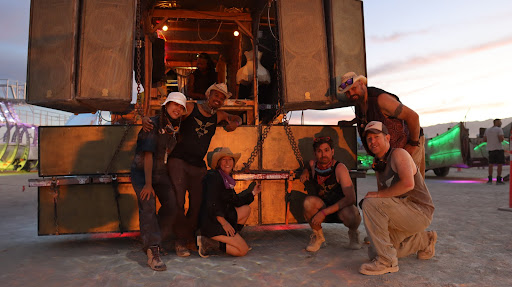
Why do you think this is so difficult to get through to folks?
I think there’s a lot of ego involved, and the reason I think that is because there’s ego involved with me. I have an art car and I think that all of us who are in this scene are able to fall victim to this stuff. So I can speak from my own experience. We’ve had “big DJs” play on Airpusher. As a producer who wants to provide dance music experiences for others, those sets felt wonderful because I got to provide great dance music to the community. But on another level, there’s ego involved too. I’m like, “Oh my god, this is so cool. My ego feels great. I have this famous DJ playing on my art car, this is going to raise our level of status in the community!” I’ve 100% had these thoughts, and I’ve had to be vigilant to let them go because that’s not what this is about. I don’t want that to be what Airpusher is about.
I think it takes a lot of connecting with the values of the event and having a healthy and vibrant community that participates in all aspects of your camp or your experience. The danger is getting too wrapped up in who you’re booking and not the gift that you’re giving. There’s nothing wrong with giving the gift of amazing dance music. That’s a fantastic gift to be giving, but is that necessarily only done by booking big DJs from around the world? I can tell you the answer is no. There are incredibly talented DJs who are part of this community who have never played outside of their home city. I’ve heard sooooo many amazing sets from DJs who are just part of their local scene and do Burning Man because of the values and are proactive co-creators of this experience that exists nowhere else in the world.
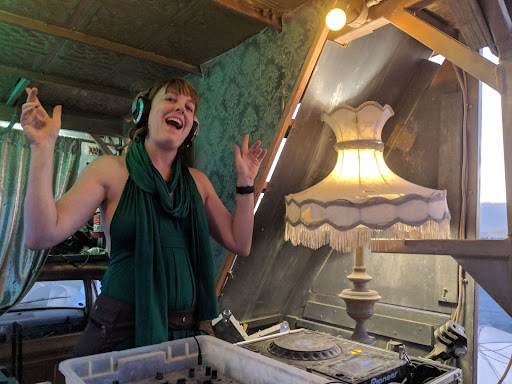
I like that you bring it back to Gifting and the intention behind the gift. What about the sort of DJ-following culture in Black Rock City? You might hear an amazing set out at some random camp in the city, and you may have never even thought about that if you didn’t go explore those back streets. What do you think is driving more and more participants out to the huge sound systems? And what would you say to participants to try and encourage them to check out some of the smaller offerings that a lot of people put a lot of time and effort into?
Yeah, all of this stuff is so tricky and sticky and there’s no right or wrong answer. As one who has been going to Burning Man for two decades, I’ve done it all the ways. There are some people who, like me, really love dance music and really feel connected to certain DJs and want to see them play a set on the playa, and there’s nothing wrong with that. I would just really encourage people to not hyperfocus on that, and to allow yourself to get distracted along the way. If you’re busting your ass to go see some big name DJ and you come across some other experience that’s happening in front of your face, do that! Part of the point of Burning Man is Immediacy and Participation, and sometimes what’s not important is the schedule or the destination. Sometimes what’s important is just doing the thing that’s in front of you. That might not be dancing, that might not be a DJ, that might be an upside-down ice massage on this wheel thing, and that might be the best thing you do all week! I hope that people will go to Burning Man with the dance music and the DJs being a part of an overall experience, but to really lean into the things that you don’t get anywhere else. In the default world, you don’t get all of these groups of insanely creative people just spending an entire year thinking about fun, different, wacky experiences for you to have, and then giving them to you as a gift. You don’t get many opportunities to have so many open-hearted connections with the strangers around you.
What’s your message to fellow DJs who maybe could use some rethinking about why they come to Burning Man and play at Burning Man?
I want to take a step back and say this is not a Burning Man problem. This is a dance music culture problem. From when I started going to raves back in the late ’90s to where the dance music scene is now, there has been so much commodification of the experience overall. It has become such a commercial industry. It used to be something that people did because they loved this new music. It was underground, it was not understood, it was not popular. You had to really seek the music out, and the people who were making it made it because they loved the music, and the people who were putting on the parties did it because they loved the music. What you see now is big giant corporations getting involved in dance music because it’s a really easy way for them to make a lot of money. It’s a really easy way to sell alcohol. It’s a really easy way to sell tickets.
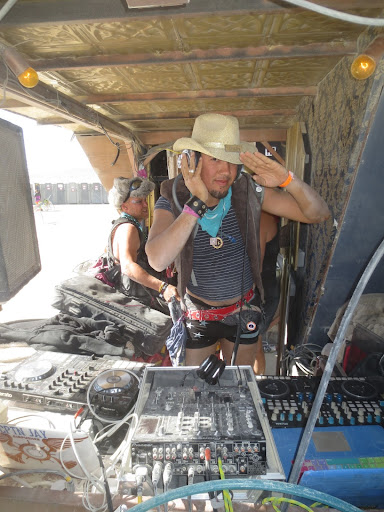
As a part of this commercialization and corporate take-over of the scene, I think that’s when the aggrandizement of the DJ started to happen. DJs are important and many are very talented, and there are some DJs who just blow my mind and can play sets that no one else could play. But in general, the kind of over-glorification of the DJ as a part of all of this consumerism and money that’s been brought into the scene has been challenging for me. I don’t think it really honors the roots of where dance music came from, which was a lot of unity, respect, and everybody loving everybody. It wasn’t so much about the DJ, it was about the music. So, all of what I just said has nothing to do with Burning Man, right? That’s not Burning Man’s fault. But it is the atmosphere in which Burning Man is existing, and it is helping to fuel some of these issues that we’re seeing inside of Burning Man.
So with all of that said, what do I say to the DJ who’s coming to Burning Man? I would say that this is such a great opportunity to reconnect with people and with the roots of the culture and hopefully with why you got into DJing in the first place. If you really love the craft then that means you spend an inordinate amount of time going through music, selecting music, and thinking about the best music to play for people at a certain time in a certain space. If that is why you got into DJing, then I would encourage you to participate in all aspects of Burning Man because only then will you really understand the context and culture into which your music is going to be absorbed.
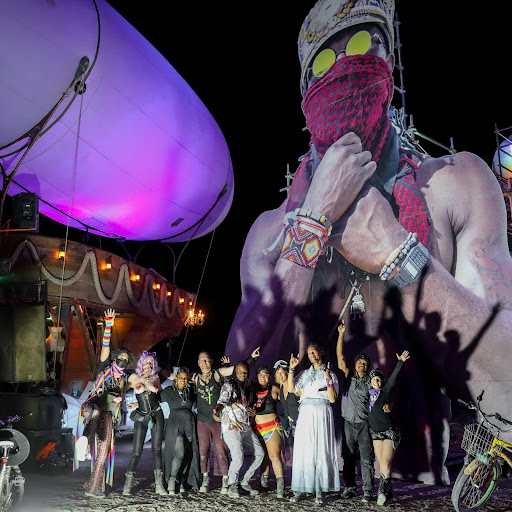
If you fly in and treat Burning Man like a festival, then you’re just going to see a festival, and play like you’re at a festival. I would encourage any DJ who is going to play at Burning Man to really lean into the full Burner experience. Familiarize yourself with the 10 Principles. Ask how else you can help make your camp experience happen. What other volunteer shifts can you do? Can you cook for people? Can you help set up? Can you do an ice run? There are a lot of other things besides playing a set that you can do to ground yourself in the experience and to help connect you with the people and the energy of where you’re at. And if you do that, you will take something away. It will make you a better person and it will make you a better DJ. It will make the music that you play at the event land better. It will be something that you can take with you on the rest of your adventures and your career and your life.
We’re trying to create a whole city, a whole community, that is non-commercial and non-consumeristic. I’m not trying to say that Burning Man is the answer to the world’s problems, but we all desperately need to collectively invest in making the world a better place. We need to manifest better versions of the collective structure of humans. We all need to participate in that in some way, and that’s what Burning Man is — one attempt at a better way for us to be together. And with this intention, we need to bring all of ourselves to this experience. So how much of yourself can you put into this? You will get that much back out and so much more!
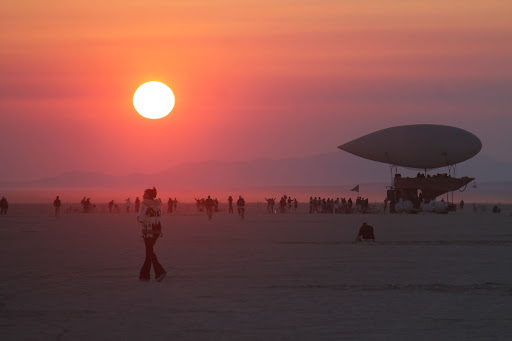
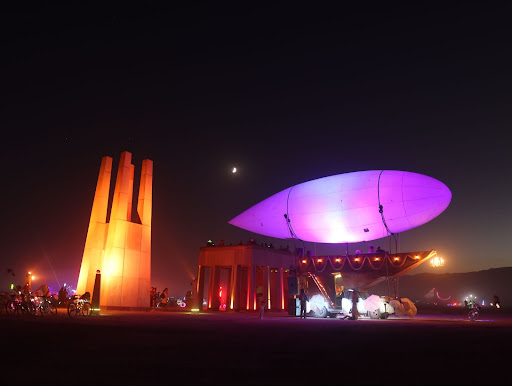
For more about dance music culture in Black Rock City, check out these posts:
-
Meet the DJs Who Started Burning Man’s First Sound Camp (2021)
-
BRC to Be Site of Groundbreaking Study to Determine if DJs are Sentient (2018)
-
Cover image of Jay on playa, 2019 (Photo provided by Jay Gregory)

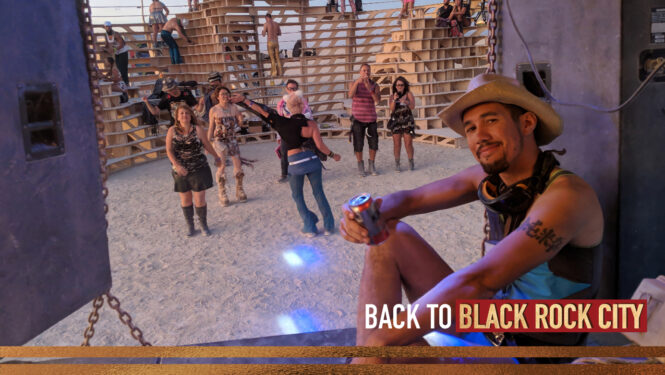
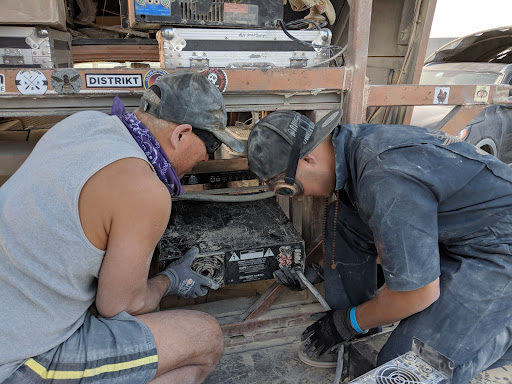

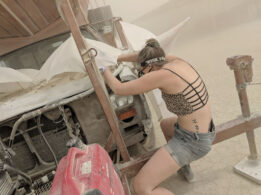
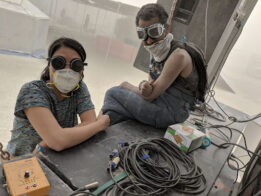
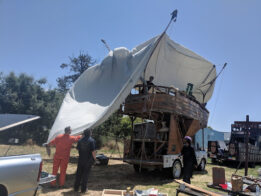
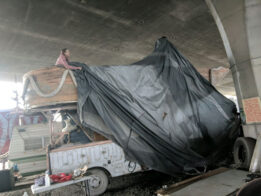
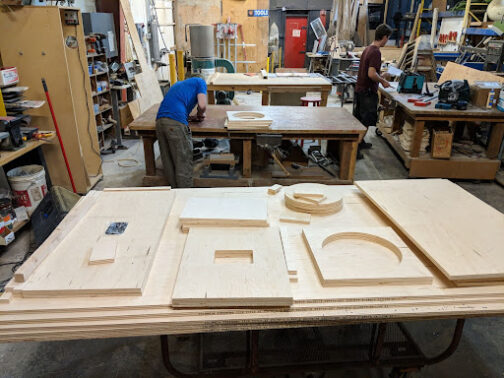
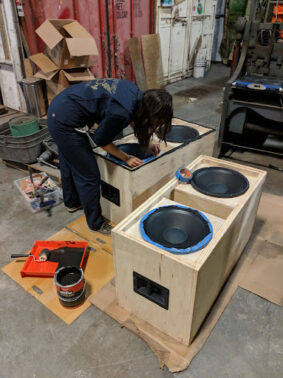
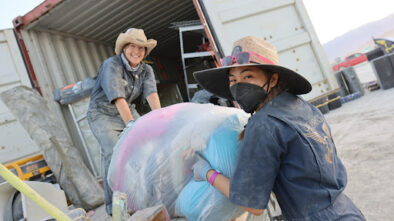
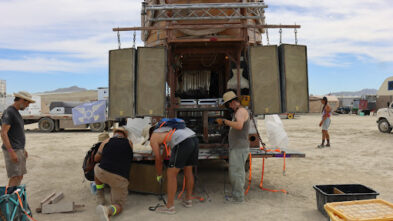
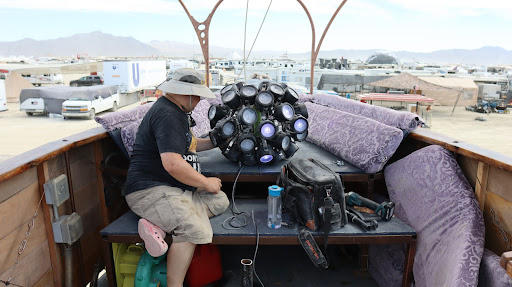
I’ve always enjoyed seeing Airpusher on the playa but dont think I have ever partied with y’all. I love how y’all are organized and staying true to the spirit of Burning Man. You get it! This year, partying with Airpusher is a priority! See you out there!
Report comment
Agree wholeheartedly with Jumping Nomad – I’ve seen Airpusher drive by so many times – it’s so beautiful and distinctive! But never stopped to say hi. This year I hope to get the chance!
Thanks Dom for bringing these folks to the forefront so beautifully, and thanks to the whole crew behind the project.
Report comment
❤️❤️❤️the legend of Cptn Jay & the AirPusher Collective!!
Report comment
Great, and I appreciate you sharing this story about Jay Austin Gregory, a DJ, event producer, community builder, and veteran Burner who is responsible for bringing theme camps, musical experiences, and pancakes to the Burning Man event for many years. We discussed the event’s evolution, what makes it a unique venue for this genre of music, the perils of commercialization, and the effort required to create and share such events with others. I’ll be sure to save your webpage for future reference.
Report comment
Comments are closed.